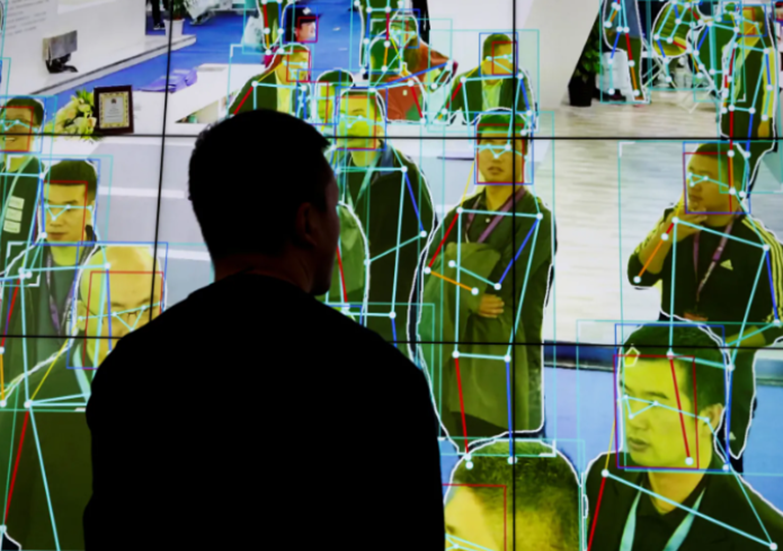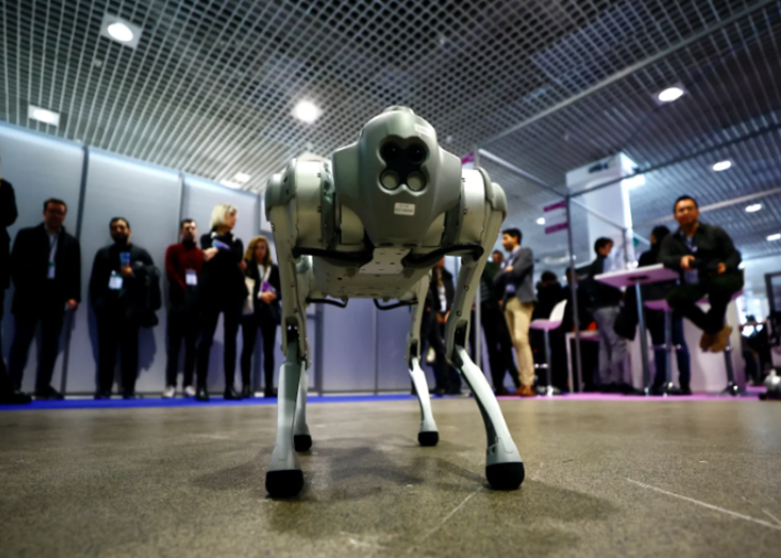The race to formulate laws on artificial intelligence

A snapshot of a technical event in which Sam Altman, CEO of OpenAI, participated in Tel Aviv, Israel, June 2023 (Reuters)
Europe is ahead of America and China for a variety of reasons
Artificial intelligence is sweeping the world with unparalleled success. ChatGPT and other new AI technologies have the potential to revolutionize the way people work and interact with information, and with each other. At best, these technologies open up new horizons of knowledge and productivity for humans, changing the state of labor markets, reshaping economic systems, and carrying the economy and society to unprecedented levels of growth and progress.
At the same time, the rapid pace of artificial intelligence development is worrying technology experts, citizens, and legislative bodies alike. Even the most tech-savvy people are warning about unregulated AI and how it leads to irreversible damage, posing serious threats to individuals and societies. This includes figures such as OpenAI CEO Sam Altman and Apple co-founder Steve Wozniak. The worst-case scenario is that AI will wipe out labor markets and turn humans into a useless quantum, or in the most extreme scenario, wipe out humanity.
As technology companies race to boost AI capabilities amid intense criticism and scrutiny, Washington faces mounting pressure to craft legislation dedicated to regulating the AI industry, while avoiding stifling innovation.
Since earlier times, diverse legal models have begun to emerge in the United States, China and Europe, and they seem to be rooted in distinct values and incentives. Not only will these different approaches reshape local markets, but they will also increasingly guide the expansion of American, Chinese, and European digital empires, each offering a competing vision of the global digital economy at the same time as it tries to expand its influence in the digital realm.
As the race to dominate AI heats up, the ways countries choose to control AI will have a profound impact on the future of technology and society. And in Washington, the debate over AI legislation has reached a juncture. The United States can no longer sit on the sidelines while China and Europe make decisions on these fundamental issues for the world.

digital empires
In terms of regulation related to regulating the digital world, the United States is taking a market-driven approach, China is developing a state-led approach, and the European Union is taking a rights-driven approach.
The American model expresses a firm belief in markets, and maintains a limited role for the government centered on protecting freedom of expression, freedom of the Internet, and incentives for innovation, as Washington views digital technologies as a source of economic prosperity and political freedom, and then sees them as a tool for societal transformation and progress. This is in its reluctance to place limits on artificial intelligence. The US approach to AI legislation is largely inspired by steadfast technical optimism and a relentless pursuit of innovation and technological advancement, with US technology companies revered as the drivers of that progress.
So, Washington views artificial intelligence as an opportunity to advance the economic growth of the United States and consolidate its superiority in both its technological and military aspects in the midst of growing US-Chinese technological competition and escalating geopolitical tensions. Thus, Washington's absolute focus on economic and geopolitical supremacy alone, made the process of setting rules regulating this field a mere secondary matter or a delayed catch-up measure. As a result, the United States has not created any substantive federal legislation on AI, simply proposing voluntary standards that tech companies can choose to adopt or Prominent policymakers, including Lina Khan, chair of the US Federal Trade Commission, have warned that leaving AI regulation in the hands of companies could come at a high cost. Khan noted the critical importance of government regulation in ensuring that everyone benefits from AI technology. Unfortunately, comprehensive regulation of AI remains elusive in the United States, given the politically dysfunctional Congress and persistent fears among policymakers that any such legislation is likely to harm innovation and undermine American technological leadership.

In contrast, China has adopted a state-led approach to digital regulation, as part of an ambitious effort to make China the world's leading technology superpower. Likewise, Beijing's practical approach to dealing with the digital economy aims to tighten the political grip of the Chinese Communist Party by spreading digital technologies as a tool for censorship, monitoring, and propaganda in a one-perspective directed manner. Thus, the Chinese government facilitated the early growth of the domestic technology industry. However, in recent years, Beijing has launched a strict and proactive crackdown on its technology sector under the pretext of promoting “shared prosperity” and in order to prevent the dominance of technology giants over the Chinese state.
Acknowledging the potential economic and political benefits of artificial intelligence, the Chinese government is heavily subsidizing new tools that improve its capabilities in mass surveillance of its citizens in the name of maintaining social stability. By extension, China's authoritarian regime in technology is incentivizing the country to draft regulations for artificial intelligence. For example, although AI-assisted facial recognition technology helps Beijing's efforts to exert political control, generative AI , such as Chat GPT, may undermine that control. It is known that generative AI relies on large amounts of data, and this technology continues to evolve as it spreads. Therefore, this development constitutes a new challenge for the Chinese censorship system, which may face great difficulties to keep pace with it and withstand it.
The ways countries choose to control AI will profoundly affect the future of technology and society
In the face of these potential challenges, Beijing is determined not to let the country's artificial intelligence capabilities escape its tight grip. In 2022, the Chinese government introduced regulatory laws that represented a milestone in this field, as those legislation targeted deep falsification techniques and recommendation algorithms [i.e., automated mathematical equations that work to suggest content by filtering information related to the digital behavior of the user to expect that he may like a specific product, so it recommends with it]. Such legislation threatens to undermine the basic rights of Chinese citizens and their confidence in digital technologies, and also heralds the CCP's takeover of China's digital economy.

A presentation on artificial intelligence at an exhibition in Beijing on security and public safety, in October 2018 (Reuters)
In April, the government released draft generative AI regulations that would hold developers responsible for prohibited or illegal content, including content that deviates from the political values of the Chinese Communist Party.
Thus, these legislative developments indicate that the Chinese government is committed to leading the country's AI future with a firm hand, encouraging technological progress while ensuring that AI does not undermine the social stability and political control of the Chinese Communist Party.
In a different path, the European Union has moved away from both the United States and China in its leadership by creating its own legislative model, focusing on the rights of users and citizens. From a European perspective, AI heralds a digital transformation with disruptive potential that should not be left to the whims of tech companies, but must instead be firmly rooted in the rule of law and democratic governance. On the ground, this means that governments must intervene in the interest of upholding the basic rights of individuals, preserving the democratic structures of society, and ensuring the fair distribution of benefits arising from the digital economy.

In fact, for a long time, this European rights-based approach has expressed itself in the form of innovative EU legislative rules, including the European General Data Protection Regulation, which protects the privacy of citizens' data. [The European Data Protection System was established in 2016, and was based on principles contained in the memorandum on data protection 1995, in addition to a set of laws, including legislation on the transfer of data of American giant technology companies, from the territory of the continental union to the United States].
The European Union also recently adopted the Digital Markets Act, which imposes obligations on “digital gatekeepers,” as they are called, including the US tech giants, with the aim of limiting their dominance and protecting competition. The European Union has also introduced the Digital Services Act, which sets rules for online platforms to be held responsible for the content they host. In fact, developments in artificial intelligence are pushing Europe further in this direction.
Finally, EU lawmakers have passed a sweeping bill called the AI Act that seeks to mitigate the dangers posed by AI and ensure that people's fundamental rights are protected . Under the bill, which is expected to be completed by the end of this year, artificial intelligence systems that exploit individual vulnerabilities or manipulate human behavior will be banned. It will also ban “predictive policing” [algorithms specializing in the use of data available on the Internet to predict crimes and reveal the identity of supposed criminals], in addition to preventing the use of face recognition technology in real time in public places because it threatens basic rights and freedoms, and places large segments of the population under surveillance. persistent.
To complete, only a moment separated between the European Union's adoption of the artificial intelligence law and the launch of the "Open AI" company to the public, "Chat GBT" in November 2022, as that last step led to European lawmakers facing a thorny challenge regarding How to formulate a law on a type of artificial intelligence that is general and non-specific, that is, it may be harnessed to achieve both extremely dangerous goals and safe goals. It is not inconceivable that this issue will dominate the final stages of the legislative process, but the European Parliament has previously indicated that generative AI must comply with various transparency requirements, stating that it should be designed in a way that deters it from violating basic rights or creating illegal content. Once this binding legislation is completed, it will become the world's first comprehensive AI regulation.

Neither the market nor the state
The difference in visions of Washington, Beijing and Brussels regarding the era of artificial intelligence constitutes a major step in the ongoing construction of three separate "digital empires" that compete for control over the future of technology and try to expand spheres of influence in the digital world, while other countries are looking for guidance regarding artificial intelligence legislation. .
The promise of AI to fuel technological progress and economic growth, along with the challenges of regulating a rapidly evolving technology, will likely lead some governments to opt for voluntary guidance, such as the United States. The market-driven American model has generated enormous wealth and fueled technological advances that make it the envy of it. At the same time, the consequences of the absence of laws regulating the work of American technology companies are becoming more and more clear, as Washington ignores many market failures, which has caused repeated abuses of market power by leading technology companies such as Google, which monopolizes digital advertising technologies over Competitors account. These market imbalances, along with the spread of misinformation and scandals surrounding technology companies' exploitation of users' personal data, are fueling a growing and widespread suspicion of technology companies. In order to reduce the enormous power that US technology companies wield over overseas Internet users, governments around the world are now seeking to reassert control of their digital markets and rein in the leading technology companies. The American public, and American lawmakers across the political spectrum, are now calling for more government oversight of the technology industry.
Washington must be decisive in its desire to play a role in building the digital world of the future
As the appeal of the US approach wears off, the Chinese state-led model is gaining strength. China has already embarked on the construction of the Digital Silk Road andExporting AI-based surveillance technologies and other digital infrastructures to governments around the world. Authoritarian governments are drawn to China's model because of Beijing's proven ability to combine burgeoning innovation with political control. But generative AI may change their minds, showing that tighter control leads to less innovation. Despite its global leadership in AI-based surveillance technologies, China still lags behind the United States in developing generative AI systems. This is due in part to the country's censorship laws that limit the data companies are allowed to use to train generative intelligent models, suggesting that Internet freedom may best serve innovation and economic growth, at least in this category of digital technology.
If the US market-driven model seems too permissive, and the state-led Chinese model too constraining, perhaps the European approach is an appropriate alternative, that is, a third approach that seeks to check corporate power while protecting basic rights and preserving democratic institutions. Amid the growing backlash against US technology companies, governments around the world, including those in Australia, Brazil, Canada and South Korea, are moving away from business frameworks controlled by market forces. In turn, these governments are increasingly tempted to follow the lead of European digital regulations in order to regain control of their digital economies.

The robot named Big Dog during a presentation at the French International Artificial Intelligence Festival in Cannes in February 2023 (Reuters)
The European Union may well be shaping the development of global AI even if other governments do not follow its legislative lead. Technology companies often extend the scope of the EU's tough regulations because their business operations are global, forcing the standardization of their products and services around the world, a phenomenon called the "Brussels effect". For example, AI developers who want to use European data to train algorithms will be required to respect EU law on AI even outside EU borders. But if they want to evade EU regulations, they will have to develop entirely new algorithms devoid of any European data.
In a telling example, Sam Altman of OpenAI threatened in May to pull ChatGBT from EU countries, citing emerging regulatory restrictions. He quickly retracted his threat after a few days, amid sharp criticism from European lawmakers. The dominance of the legislative approach adopted in Europe is likely to lead to mixed reactions. Some citizens and foreign governments may welcome Europe's efforts and take comfort in knowing that the EU's digital protection includes them. Other foreign stakeholders, however, may accuse the EU of regulatory imperialism, arguing that the "Brussels effect" threatens to undermine innovation, economic growth, and societal progress everywhere, as well as the ability of foreign governments to regulate AI according to their values. And her interests.
The future of the artificial intelligence revolution
At a time when the European Union and China are leading the race to regulate artificial intelligence, Washington must be decisive about its desire to play a role in building the digital world of the future. The emergence of technological competition between the United States and China may persuade Washington to go to extremes in favor of the unrestricted development of artificial intelligence [meaning that it is not regulated by legislation and laws of its own], as this is consistent with the insistence of policy makers in the United States on the advantages of free markets, and their commitment to confidence in the ability of companies Technology and its desire to curb any damages related to artificial intelligence. Also, simply put, the United States may find itself unable to regulate AI technology because of a dysfunction in the American political process. In earlier times, meaningful and effective legislation in the area of artificial intelligence has been stymied. As a result, relentless pressure from tech companies has cemented the status quo.
However, three recent developments suggest that the United States may abandon its tech-liberal approach to regulating artificial intelligence, thereby joining the European Union.

First, domestic support for regulation has reached a tipping point, with leading AI experts and developers such as Sam Altman and AI pioneer Jeffrey Hinton joining legislators and the public in supporting AI regulation. In this new political environment, inaction in drafting legislation seems difficult to defend. Second, the US may ultimately choose to co-regulate with the European Union rather than give that union the lead in regulating the US market on its own through the "Brussels effect". Third, the shared concern between the United States and the European Union about China's growing global influence provides a strong impetus for closer transatlantic cooperation.
Time and again, the United States has emphasized its desire to partner with the European Union and other democratic allies to promote standards consistent with civil rights and democratic values, and to consolidate a united democratic front against China and its digital authoritarian allies. The Biden administration has been drawing ideological battle lines in its relentless effort for technological dominance, portraying the competition as a battle of tech democracies against tech authoritarian regimes. And if Washington really views competition this way, then the issue of US-EU cooperation is indisputable. The United States and the European Union would set aside their differences and develop common standards on AI that are designed in the interests of promoting innovation, protecting basic rights, and preserving democracy.
As a conclusion, the coming years will be marked by a clear victory for some parties and a clear loss for others. This will not only be evident in the race to develop artificial intelligence technologies, but also includes competition between legislative approaches to control these technologies. These competing trends will also empower technology companies, governments, or digital citizens in different ways, with far-reaching economic and political consequences. Thus, the way governments deal with these choices will determine if the ongoing AI revolution will serve democracy and achieve unprecedented prosperity, or if it will lead to serious societal damage, or even an unexpected disaster.
Anno Bradford is Professor of Law at Columbia University and author of the forthcoming Digital Empires: The Global Battle to Regulate Technology.
Source: websites

